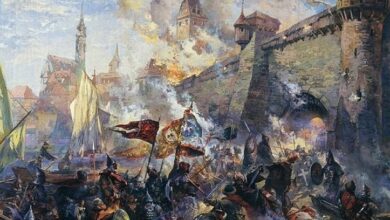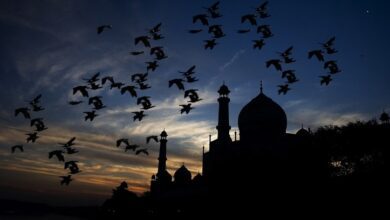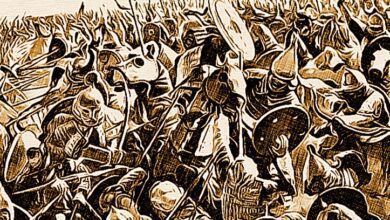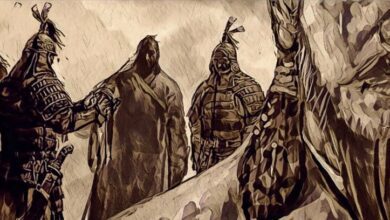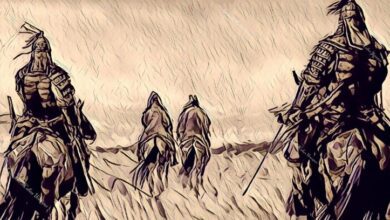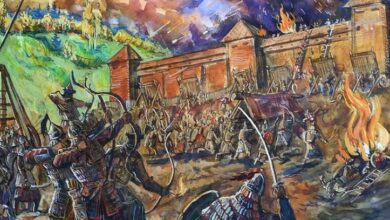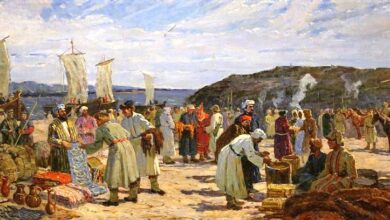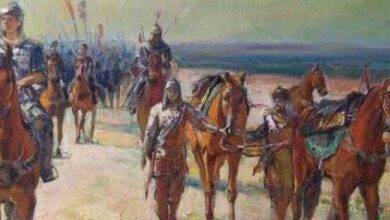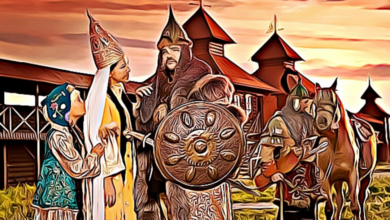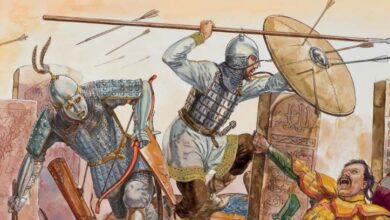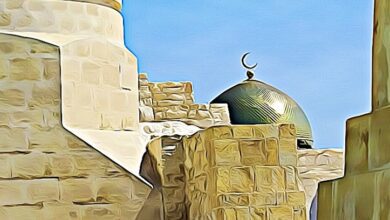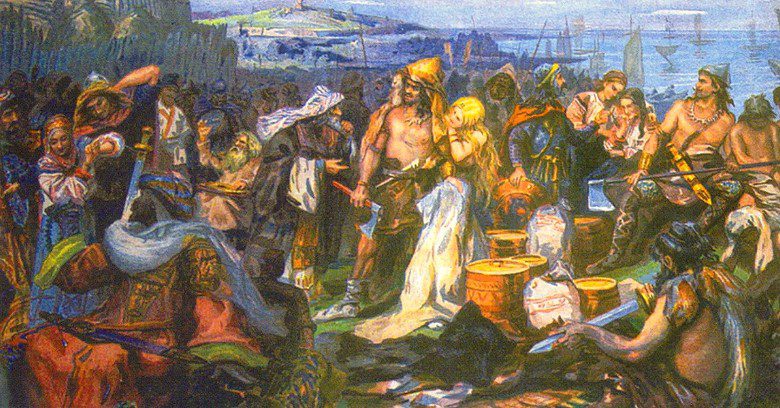
Ghazi Baraj Tarihi. Chapter 9
PRight before the campaign, Salahbi decided to buy himself a horse and set off from the Bulgarian balik Aka-Basar to the Khaldzha balik, which was also called the Khorezmian balik. There he looked after a Turkmen horse named Jilan. However, when buying, he dropped one coin under the horse’s feet and inadvertently bent down after it. Jilan, trained to stomp foot soldiers in battle, immediately hit him with a hoof and killed him outright. Almysh was shocked by the loss of his faithful jura and personally attended the funeral of Salahbi. Some of the Sadumians, hired by Salahbi, went to their land shortly after the funeral along Aikha Yuly, and the campaign that was being prepared did not take place ... Another part of the Sadumians went to Jir together with the son of Salahbi Khum, appointed by Almysh as the new Bulgar governor of Jir. When those who sailed to Sadum returned to Jir, they told Hum that his grandfather Erek was still alive and that after the defeat of Hud, he took the name Hud in memory of this. In 925, Hum was knocked out of Djir by Ugyr, but in the same year he was brought back by Almysh...
In 943, Hum was sent by Kan Yalkau on a campaign against Gurja, in which they again began to oppress the local Khons or Sevars. Huma's detachment went on ships to Itil, where Modjar arrogantly tried to stop him. Annoyed by the shots from the shore, ours landed near the Khakan's palace and took it by storm. Bek was killed, and his henchman Yusuf fled to the Cumans. Alan, liberated from the dungeon by the Itil Burjans, sat on the Khazar throne without much ceremony. The new khakan immediately let our detachment into the sea. Having sailed it, Hum climbed along Karachay to the city of Alaberda. Although it was a city of Muslims, they were firmly connected with the infidel Gurjians and Modjar, which is why they met ours with extreme hostility and refused to let them go to Gurja. For several days, Hum tried to reassure these people, who had sold their fellow tribesmen for the sake of profit, after which, at dawn, he captured the Alaberde citadel and offered the bek of the city to conclude an agreement with him on the passage of the Bulgars to Gurja and back. But the Vali of the city was even more presumptuous than Modjar. He decided to become famous for his victory over the Bulgars and ordered the inhabitants to prepare for the assault on the fortress. When even the Gurdjians, frightened by the appearance of the Bulgars at their borders, released the leaders of the Sevars to them in Alaberd, the Vali seized these biys and attacked the citadel. Having not achieved any success, the bek treacherously offered Humu to leave the city in exchange for the release of the Sevars and a ransom. Ulugbek Jira agreed, but when he left the citadel, the wali attacked him. Ours broke through and returned, but Hum was mortally wounded. Dying, he felt regret over his forced skirmish with the Muslims and therefore bequeathed to his son Sip to transfer all the booty to the mosque. With these funds, a two-story mosque "El-Khum" was built in Nur-Suvar, a beautiful building of which resembled a kumgan from the outside, and a gallery protruding from the south - a handle. The walls of the mosque were decorated with amazing ornaments and images of birds and animals. A wonderful garden was laid out around it, in the center of which a small lake was arranged, and it became the main attraction of the city ...
62
And Syp often sailed to Bashta, transporting his ships from Idel to Shir along Bekhtash, and therefore received the nickname Shambat. He was friendly with Salman, who sailed with his father to Alaberda. And their possessions were nearby, in the district of Ulem ... And also the possessions of the descendants of Huma, who were called the house of Utar - after the name of the ancestor Khud-Erek, were located on Chuyl and Agidel. Many glorious salchibashes came out of this house, the owners of ferries and merchants who sailed to the homeland of Ugar - the very north of Sadum - Urman ... Once the ship of Syp-Shambat fell into a terrible storm, and in fear he appealed to the mercy of the Almighty, promising to convert to Islam in case of salvation. The Creator spared the sailor, and Syp-Shambat, upon arrival in Bulgar, took the name Gusman... With his own money, he built the Gusman fortress on the Dzhuk River, which became the main one on the Nukrat route to the north. And this yul began in Bol rape. From Bolgar they sailed along Agidel and Nukrat-su, and then passed to the Gusman fortress, where the roads from Djir and Bolgar joined. And from Gusman-Katau, along the Dzhuk and Tun, they went to the Bishek River, along it they got to the tributary of the Biy-su Oshma, and along the Oshma they also passed to the Biys. The branch of the Nukrat road, which went from Bolgar along Agidel and Chulman to Biysu, was called the Chulman road ... And about the origin of the names of these rivers, seid Yakub wrote the following. One day, the son of Aikhi Mizan sailed from Urman to Biysu and decided to shorten the path - not to get to the mouth of the Biy-su, where the city of Ak-Artan was, but to take a closer route. He landed at the mouth of some river, which began to be called after him, and then went along its tributary to the Biys. The Shud biy chased after him and mortally wounded the merchant's companion, Bozai. Therefore, the river was named after him. Then Mizan left the chase along the left tributary of the Biy-su almost without rest - and nicknamed him Yalitme.
63
This name later became Djalma. Only at Bii-su, where there were outposts of our Biisu Ars, he was finally able to rest. From Biysu, he was already completely safe and slowly headed south along the river, which he called Ashykma, and over time this word was turned into Ashma ... The Mizans were mainly engaged in trade in northern goods - fangs and horns of water and field Azhdaha, furs, honey and wax . However, they were tireless in their travels. Mizan's son was even nicknamed Yulbat... Kan Mohammed ordered his son Bulat to sell the right to collect tribute from the Ars of the Ish district, which is why he was nicknamed Ish-Bulat. One day, a buyer of his goods from Azerbaijan, Minas, came to him on the Sudzha River and asked him to tell him about the road to the north. "Why do you need to know this?" asked the surprised Bulat. - “Goods from the north are always sold at fabulous prices and this is explained by the difficulty of the way to the north. I don’t believe in this and I want to buy these goods on the spot myself,” Minas replied. “But this is true, and only an unusually hardy person who knows the nature and customs of the peoples of the North will be able to get there and return from there - and then at the greatest risk to his life,” Ish-Bulat objected, trying to stop the merchant. But he got even more excited and accused Bulat of cheating. Then the son of Yulbat showed him the safest of all the roads to the north - Nukrat and offered to accompany him, but Minas refused and went alone. By the scheduled date, he did not return, and the alarmed Bulat followed in his footsteps. Not far from the mouth of the Ot River - the left tributary of the Nukrat-su - he discovered a block of ice with Minas frozen into it ... As soon as the rivers opened up, Ish-Bulat again arrived at this place and cellared the merchant, and gave his son his name. After that, the Ot River began to be called Quilmes (“Will not return”) ...
Guzman's son was Ker, nicknamed Ker-Hum because he married a captive slave, Rumka. He, along with his father, on the orders of Talib, participated in the campaign of the Bashtuy Bek Barys against Rum ... Tuki was the son of Ker-Khum, his son was Kadyl, his son was Shuran, his son was Mishar, his son was Kukchi, his son was Kalga Shirdan , his son is Khalmysh, who recaptured Emir Azan from the Russians, his son is Khair, his son is Gali, who ferried Bek Gazan across Agidel and then took refuge on Ashita ...
[A fragmentary extract from the manuscript of the code: “The son of Gali was Kutlug, who went to Dzhuketun, his son was Asyl, who fought in 1278 at the crossings with the Tatars and then hid in his estate until 1293, his son was Urus-Kuyuk, his son was Amat, who resisted Bulum-Orda (Bulyum-Orda) in 1323 and then hid in his possession until ..., his son - Bui ... "] 64And shortly before the death of Salahbi, Gazaya’s wife, the Khorezmian Musalla, died, and after her, Bat-Ugyr, who had just returned from Khazaria ...

